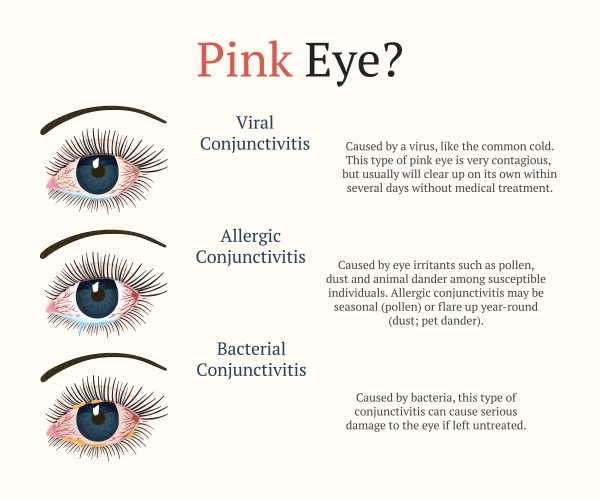Viral conjunctivitis, also known as pink eye, is a common eye infection that can cause redness, itching, and discharge. A viral infection causes it and can be highly contagious. Understanding the symptoms and causes of viral conjunctivitis is essential to treating and managing the condition effectively.
The symptoms of viral conjunctivitis include redness in the white of the eye, watery discharge, itching or burning sensation, and increased sensitivity to light. These symptoms can be uncomfortable and affect your daily activities. Viral conjunctivitis is typically caused by adenovirus, which is highly contagious and can spread quickly from person to person.
To prevent the spread of viral conjunctivitis, it is important to practice good hygiene and avoid touching your eyes. Washing your hands frequently with soap and water, especially before and after touching your eyes, can help reduce the risk of infection. To prevent the spread of the virus, avoid sharing towels, pillows, or other personal items with others.
Fast-Acting Viral Conjunctivitis Treatment

While there is no specific cure for viral conjunctivitis, several treatment options are available to relieve symptoms and promote healing. These treatments can help speed up the recovery process and reduce the discomfort caused by viral conjunctivitis.
Artificial tears
Over-the-counter artificial tears can help soothe the eyes and temporarily relieve dryness and irritation.
Cold compress
Applying a cold compress to the affected eye can help reduce redness and swelling. It can also provide relief from itching and burning.
Antihistamine eye drops:
Antihistamine eye drops can help relieve itching and allergic reactions associated with viral conjunctivitis.
Lubricating ointments:
Lubricating ointments can help protect the eyes and relieve dryness and discomfort.
Prescription medications
In severe cases, your doctor may prescribe antiviral or steroid eye drops to help reduce inflammation and speed healing.
It is essential to consult with your healthcare provider before starting any treatment for viral conjunctivitis. They can provide personalized recommendations based on the severity of your symptoms and medical history.
Preventing the Spread of Viral Conjunctivitis
Preventing the spread of viral conjunctivitis is crucial to protect yourself and others from infection. Here are some measures you can take to prevent the spread of viral conjunctivitis:
1. Practice good hygiene: Wash your hands frequently with soap and water, especially before and after touching your eyes. Avoid touching your eyes with unwashed hands.
2. Avoid sharing personal items: Do not share towels, pillows, or other items with others, as they can quickly spread the virus.
3. Disinfect surfaces: Clean and disinfect frequently touched surfaces, such as doorknobs, countertops, and phones, to reduce the risk of spreading the virus.
4. Avoid close contact: To prevent the spread of the infection, avoid close contact with individuals who have viral conjunctivitis.
Following these preventive measures can reduce the risk of contracting viral conjunctivitis and prevent its spread to others.
Conclusion
Viral conjunctivitis is a common eye infection that can cause discomfort and affect daily activities. By understanding the symptoms and causes of viral conjunctivitis, you can take appropriate measures to prevent its spread and effectively manage the condition.
While there is no cure for viral conjunctivitis, several treatment options are available to relieve symptoms and promote healing. It is essential to consult with your healthcare provider for personalized recommendations based on the severity of your symptoms.
Practising good hygiene and following preventive measures can reduce the risk of contracting viral conjunctivitis and protect yourself and others from infection. Remember to wash your hands frequently, avoid sharing personal items, and disinfect often touched surfaces.
If you have any concerns or questions about viral conjunctivitis, it is best to consult with your healthcare provider for proper diagnosis and treatment. They can provide guidance and support to help you recover quickly and comfortably.
FAQs About Viral Conjunctivitis
What are the symptoms of viral conjunctivitis?
Symptoms of viral conjunctivitis include redness in the white of the eye, watery discharge, itching or burning sensation, and increased sensitivity to light.
How long does viral conjunctivitis last?
Viral conjunctivitis typically lasts for 1 to 2 weeks. However, the duration can vary depending on the individual and the severity of the infection
Is viral conjunctivitis contagious?
Yes, viral conjunctivitis is highly contagious. It can spread quickly from person to person through direct contact or by touching contaminated surfaces.
What are the four types of conjunctivitis?
The four types of conjunctivitis are viral conjunctivitis, bacterial conjunctivitis, allergic conjunctivitis, and chemical conjunctivitis.
Can viral conjunctivitis go away on its own?
Yes, viral conjunctivitis can go away on its own without treatment. However, treatment can help relieve symptoms and speed up the recovery process.